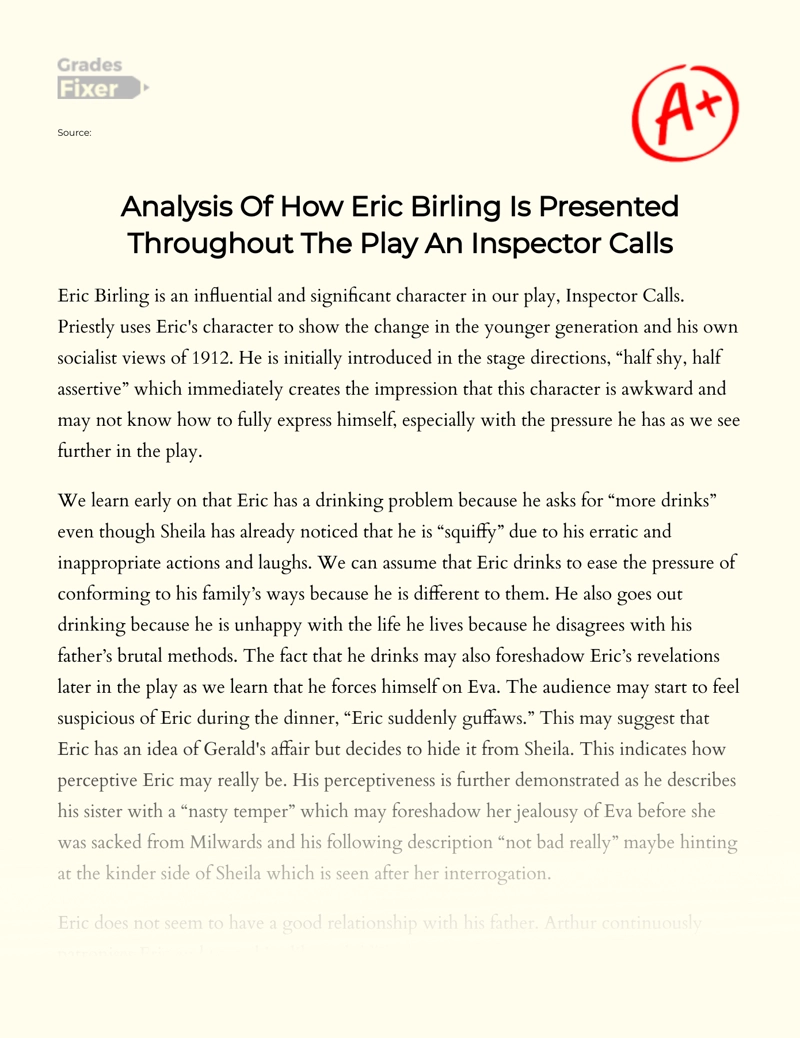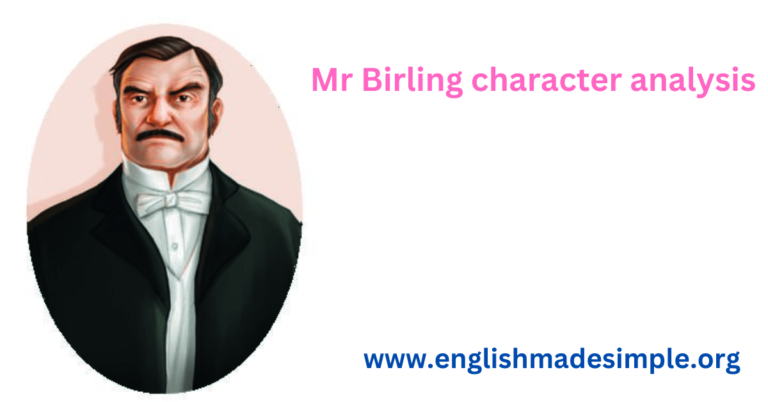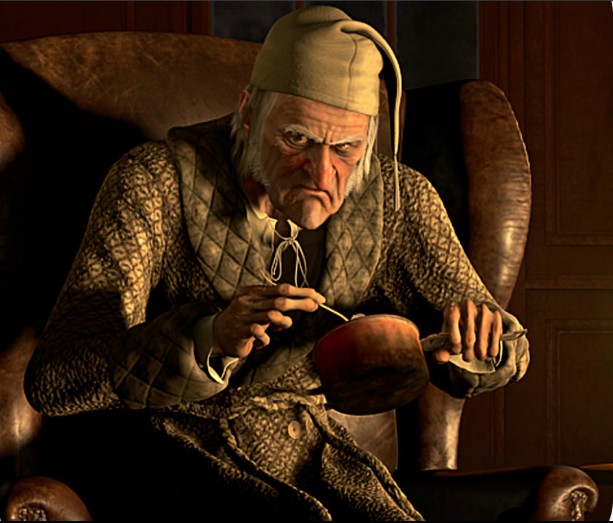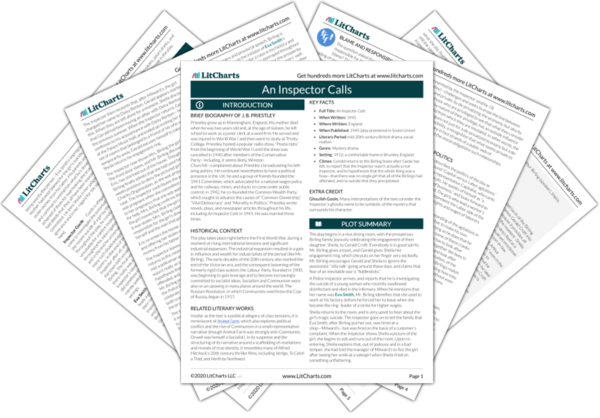Exemplar Essay: Arthur Birling
How does Priestley present Arthur Birling?
Early in the play, Priestley presents Arthur Birling as selfish. During Birling’s speech about how he runs his factory, Priestley has Birling state ‘a man has to mind his own business, look after himself and his own’. In other words, Birling is saying that he must only use his money to help himself and his own family. Priestley’s use of the words ‘his’ and ‘himself’ reveal how selfish Arthur Birling is. It is clear that he is not interested in taking care of his workers, which is not what you’d expect from someone in Birling’s important position. Priestley uses Birling to criticise selfish upper class businessmen in 1912, who did not do enough to help the working class people who worked for them.
As the play continues, Priestley presents Arthur Birling as irresponsible . When the inspector questions Birling, the audience learns that he ‘refused of course’ when Eva Smith asked for a small pay rise. Priestley’s use of the word ‘refused’ demonstrates that Birling didn’t even carefully consider giving the pay rise, which reveals how irresponsible he is. As a factory owner, he should have been taking responsibility for his workers but, instead, he was only interested in looking after himself. He was too worried that a small pay rise would eat into his profits, so he didn’t allow it. When the inspector tries to make Birling feel guilty that his actions contributed to Eva Smith’s death, Birling says ‘I can’t accept any responsibility’. In other words, Birling is stating that he doesn’t believe his actions led to Eva Smith’s death. It is clear from Birling’s presentation that Priestley wishes to criticise upper class people for not taking enough responsibility for working class people. He wants to convince his 1945 audience to take more responsibility and build a fairer society for everyone.
Later in the play, Priestley presents Arthur Birling as unwilling to learn. Priestley has Arthur Birling say to the inspector ‘I’d give thousands’. It is clear from these words that Birling is trying to pay the inspector to keep quiet about his involvement with Eva Smith because he wants to protect his reputation. Even though Birling has realised that his actions helped kill Eva Smith, he is still only thinking about himself, which indicates that he hasn’t learned at all. Priestley contrasts Arthur with his daughter Sheila, who says ‘I started it’, which demonstrates that she takes full responsibility for her actions. Unlike Arthur, Sheila recognises that her actions helped trigger the chain of events that led to Eva Smith’s death. Priestley does this in order to show the difference between younger and older characters. Whereas the older characters are unwilling to learn, the younger characters learn and mature throughout the play. Perhaps he aimed to show his 1945 audience that it was up to the younger generation to change society because they were more willing to learn from their mistakes.
In ‘An Inspector Calls’ Priestley presents Arthur Birling as selfish and stubborn. Through Arthur Birling’s character, Priestley not only challenges the capitalist viewpoint that dominates society but also criticises the irresponsibility of the wealthy, older generation.
Before the inspector arrives, Priestley portrays Arthur Birling as a selfish and foolish man to challenge his capitalist view. Just before the inspector enters, Priestley has Arthur Birling confidently deliver a speech to Eric and Gerald about his views on society. In this speech, Priestley has Arthur confidently declare that the Titanic is ‘unsinkable, absolutely unsinkable’. Through the repetition of the words ‘unsinkable’, Priestley suggests that Arthur Birling is extremely confident in the new streamliner. By using dramatic irony, Priestley is able to immediately show the audience that Arthur Birling’s views are foolish and arrogant because they would have known that the Titanic did sink. Perhaps Priestley wanted to instantly convey that Birling is foolish and wrong so the audience learns not to trust his views from the beginning. After Birling wrongly states that the Titanic will not sink, he boasts that a ‘man has to mind his own business, look after himself and his own’. As an arrogant businessman, Arthur believes that a man should work hard to be successful in life and has no interest in helping his workers or the wider community. Priestley’s use of the pronouns ‘himself’ and ‘his’ indicates that Birling is only interested in himself and supports the capitalist view that a man should only care about himself. By structuring Birling’s speech in this order, Priestley has already revealed to the audience Birling is wrong so that they do not trust the capitalist views he proudly shares with Gerald and Eric. Additionally, Priestley has the inspector enter at this moment to demonstrate that Arthur’s views are foolish and deserve to be interrupted.
During the inspector’s questioning, Priestley presents Arthur Birling as irresponsible to criticise the behaviour of wealthy businessmen. Upon being questioned by the inspector, Arthur selfishly admits that he ‘refused’ to give his workers higher wages ‘of course’. Rather than choosing to be a responsible employer and giving his workers a rise that he could easily afford, Arthur Birling proudly refuses to give his workers any more money. Priestley uses the words ‘of course’ to demonstrate that Birling believes he was right in refusing his workers any more money and that it was the obvious decision to make. By suggesting that Birling thinks this was obvious, Priestley implies many wealthy businessmen adopted the selfish model of paying their workers a minimum amount of money so that they could benefit from a higher profit. Not only does Birling not fulfill his duty of looking after his workers, he also refuses to admit that he played a role in Eva Smith’s death. As the inspector continues to interrogate Birling, Arthur Birling admits that he ‘cannot take any responsibility’ for Eva’s death. Despite knowing that by firing Eva he could have contributed to her death, he chooses not to acknowledge this. Priestley’s use of the word ‘any’ could be used to imply that Birling is unwilling to take even a small part of responsibility in her death which shows he is unsympathetic of the difficulties faced by the working class. Not only does Priestley use Birling to criticise the wealthy businessmen who did not take responsibility for their workers, he also criticises the way in which the older generation were too stubborn to learn from their mistakes. Perhaps Priestley wanted to encourage his audience to see the consequences of selfish behaviour in order to encourage them to take more responsibility.
As the inspector prepares to leave, Priestley demonstrates that Arthur Birling is unwilling to learn in order to challenge the stubborn nature of the older generation. Just before the inspector leaves, Arthur Birling states that he would give ‘thousands’ in order to make the situation with Eva Smith disappear. Not only does Priestley reveal here that Birling is wealthy enough to pay his workers more money, he also insinuates that Birling only uses his money for selfish means. Rather than feeling guilty about his treatment of Eva Smith, Birling offers the ‘thousands’ in order to protect his own reputation, showing that he has learnt nothing from the inspector. Priestley makes clear to the audience that Birling only wants the situation with Eva Smith to go away so that he can maintain his reputation and still be in the running for a knighthood. A knighthood is awarded for achievements and commitments to your country so by having Arthur Birling in the running for a knighthood, Priestley could be suggesting that Arthur Birling is hypocritical. Birling is willing to accept his knighthood and judge other people based on their moral and responsible behaviour but is unwilling to accept his responsibility in Eva’s death. Priestley might also be criticising society for being hypocritical because selfish, wealthy men like Arthur Birling are celebrated while moral working class people are often ignored and mistreated. As people in England were beginning to notice, and campaign against, the fact that society was unfair, perhaps this would have given Priestley’s audience even more motivation to fight back against the inequality in society.
Overall, through the character of Arthur Birling, Priestley encourages his audience to move away from capitalism and towards socialism. Priestley’s portrayal of Arthur as irresponsible and selfish highlights the foolish and destructive nature of capitalism and puts forward the need for a more equal society where people are responsible for each other.
Home — Essay Samples — Literature — An Inspector Calls — Analysis of How Eric Birling is Presented Throughout the Play an Inspector Calls

Analysis of How Eric is Presented in an Inspector Calls
- Categories: An Inspector Calls Character
About this sample

Words: 742 |
Published: Oct 2, 2020
Words: 742 | Pages: 2 | 4 min read

Cite this Essay
To export a reference to this article please select a referencing style below:
Let us write you an essay from scratch
- 450+ experts on 30 subjects ready to help
- Custom essay delivered in as few as 3 hours
Get high-quality help

Verified writer
- Expert in: Literature

+ 120 experts online
By clicking “Check Writers’ Offers”, you agree to our terms of service and privacy policy . We’ll occasionally send you promo and account related email
No need to pay just yet!
Related Essays
2.5 pages / 1232 words
3.5 pages / 1598 words
3.5 pages / 1677 words
5 pages / 2287 words
Remember! This is just a sample.
You can get your custom paper by one of our expert writers.
121 writers online

Still can’t find what you need?
Browse our vast selection of original essay samples, each expertly formatted and styled
Related Essays on An Inspector Calls
J.B. Priestley's play "An Inspector Calls" delves into the complexities of societal attitudes and generational differences. The interplay between the older and younger characters serves as a lens through which themes of class, [...]
Mr. Arthur Birling, a prominent character in J.B. Priestley's play "An Inspector Calls," is a complex individual whose perspectives and actions offer insight into the prevailing attitudes of his time. This essay delves into the [...]
Guilt, a complex and deeply human emotion, serves as a prominent thematic element in the play "An Inspector Calls" by J.B. Priestley. The exploration of guilt is a central aspect of the characters' experiences and the overall [...]
Some individuals possess greater authority than others. The possession of authority is beneficial and makes life more pleasant but although it brings so much ease to life, it can easily be abused to bring harm to others. In the [...]
There are drastic differences that are seen in people who are born in different generations. One may argue that the younger generations are more impressionable and naive while the older generations are very hardheaded and [...]
How is Gerald presented in An Inspector Calls? To start the essay, the character of Gerald Croft is extremely significant, as he is the only perpetrator not to be a part of the Birling household. He is also the character who [...]
Related Topics
By clicking “Send”, you agree to our Terms of service and Privacy statement . We will occasionally send you account related emails.
Where do you want us to send this sample?
By clicking “Continue”, you agree to our terms of service and privacy policy.
Be careful. This essay is not unique
This essay was donated by a student and is likely to have been used and submitted before
Download this Sample
Free samples may contain mistakes and not unique parts
Sorry, we could not paraphrase this essay. Our professional writers can rewrite it and get you a unique paper.
Please check your inbox.
We can write you a custom essay that will follow your exact instructions and meet the deadlines. Let's fix your grades together!
Get Your Personalized Essay in 3 Hours or Less!
We use cookies to personalyze your web-site experience. By continuing we’ll assume you board with our cookie policy .
- Instructions Followed To The Letter
- Deadlines Met At Every Stage
- Unique And Plagiarism Free
English Made Simple
[email protected]

- 14 August 2020 24 April 2023
- 10 Comments on Mr Birling, a character analysis.
Mr Birling, A Character Analysis

This is the first in our series of character analyses of the main characters in the play, ‘An Inspector Calls’.
It follows on from our series of articles on the themes of the play and the two, the themes and the characters are closely related and cannot be understood without each other. The themes cannot be understood without seeing how the writer Priestley, uses the characters to highlight certain themes and of course vice versa, the themes and issues being explored in the play naturally affect the characters and also play a big part in their way of looking at things.
To read the articles on the themes you can click on each of the links below:
1. An Inspector Calls’, themes, part 1: Class division and social responsibility
2. An Inspector Calls’, themes part 2: Gender
3. An Inspector Calls’, themes part 3: Age
The role/function of the Mr Birling character in the play.
To really understand Mr Birling and his role and function in the play, we need to understand what his ‘creator’ , J.B. Priestley is trying to do and why he ‘created’ Mr Birling.

Mr Birling, it can be argued, exists in the play to represent the wealthy capitalist class of modern Britain and to critique that class. Birling is similar to Ebenezer Scrooge in the Christmas Carol in that he is a wealthy businessman but far from generous. Priestley like his predecessor Dickens is attempting to encourage social responsibility and active assistance of the poor by the wealthier in society and using literature to do so by highlighting the plight of the poor and critiquing the wealthy who at times neglect them.
How successful were they in this? Well millions have heard of them and their works and continue to ready, study and discuss their plays today and Priestley himself was a politician involved in socialism, a political ideology which focuses on a more equal distribution of wealth and heavy government assistance for the poor but often by taxing the wealthy. People such as Priestley helped to create the ‘Welfare State’ in Britain which included free medical treatment for all and government money paid to people without jobs.
Click on the Link to Read About: Mr Birling Key Quotes
Arthur Birling, a brief description.
Priestly described Birling as a ‘heavy-looking man’ which means that he is big or maybe even slightly overweight. He also has a ‘provincial’ accent. What does provincial mean? Well in modern Britain, the ‘correct’ (in many people’s eyes) way of speaking or accent is what is called ‘RP’ which stands for Received Pronunciation. This is the way middle class people from the south-east of England or those educated in elite private schools (ironically in Britain called ‘public schools’ though you have to pay to study there) speak.
Accents different to those are considered by many to be ‘incorrect’ or at least less prestigious. Such regional accents include:
- Cockney, accent originally of working class Londoners but now many throughout the south-east.
- Scouse, accent of Liverpudlians.
- ‘Brummy’, accent of people from the second biggest English city, Birmingham.
- Geordie, accent of people from Newcastle or the north-east.
- Mancunian, accent of people from Manchester.
- Yorkshire, accent of Yorkshire.
In modern Britain, perhaps slightly less than a few decades back, people who want to progress upwards socially have to ‘soften’ their regional accent and make it more ‘neutral’ or more similar to the standard RP accent. In fact speaking with a very ‘thick’ Cockney, Brummy, Scouse accent would make you be considered a bit ‘uneducated’ or less sophisticated even by people who maybe from those areas, who may be fine with the usage of Cockney, Brummy, Scouse in an informal context but not in a more serious or official context. That is purely speaking about the accent and not even various slang words in those dialects.
Birling’s ‘provincial’ accent, the word Priestley himself uses clearly indicates that though he may have money now his roots are more humble and that he maybe what some call ‘nouveau riche’, a French term used in the English language which literally means ‘nouveau’ i.e. new, ‘riche’ i.e. rich or ‘new rich’.
It’s a slightly negative term implying that the person became rich recently but does not have the upbringing or culture to spend his wealth wisely and may use his money in flamboyant and extravagant clothes with inappropriate dress sense which a person from a traditionally rich family wouldn’t.
There is no mention of Birling and his dress sense but Birling occupies an intermediate space between the traditionally rich classes and the working class poor. He may have come from a poor or not so wealthy background and managed to become wealthy. This however is not enough, Birling still wants more.
An inferiority complex?
One of the most interesting questions that can be asked about Mr Birling, is does he have an inferiority complex?
What is an inferiority complex?
An inferiority complex can be understood in different ways, but one way it can be understood is that sometimes someone is missing or lacking something in order to gain social approval. You can also be very conscious that you do not have a particular quality e.g. the correct accent, income and so forth and this makes you feel uncomfortable (a complex) and this can result in exaggerated attempts to gain that ‘correct accent’, status and so on.
Mr Birling it could be argued occupies a sort of ‘no-man’s land’ between the working classes, whom he may have originally been from and whom he does not seem to care about much, and between the traditionally rich who would have a different accent and upbringing to his and also different ancestors and family, some of whom might look down on him as ‘nouveau riche’ or as ‘new money’ and as sort of inferior. We can see a glimpse of this in the quote:
““ I have an idea that your mother – Lady Croft – feels you might have done better for yourself socially ” (Act 1)
This is in relation to his suspicion that Gerald Croft’s family might feel that the Birlings are not as ‘good’ as them socially, a clear reference to the social hierarchy of that time.
Another of Birling’s most interesting quotes is.
‘You! You don’t seem to care about anything. But I care. I was almost certain for a knighthood in the next Honours List’ (Act 3)
This follows on from earlier in the play where Birling says:
‘I was an alderman for years – and Lord Mayor two years ago – and I’m still on the Bench – so I know the Brumley officers pretty well’ (Act 1)
We can see from this that having lots of money, a nice house, a wife (Mrs Birling) from a socially privileged background and children, are not enough. Birling is constantly seeking to get more and more in terms of his status and social standing. First an alderman, then a lord mayor and next to be knighted i.e. to be called ‘Sir Arthur Birling’.
Is this because Mr Birling is a competitive person who relishes challenges and just being more and more successful, or is it because something is eluding him, there is something elusive? Perhaps by getting a certain level of prestige he will not feel uncomfortable around wealthy people from traditionally wealthy families, such as the Crofts. Or is it a combination of both?
What is interesting is that Birling does indeed seem to think status is based not on how moral or virtuous or generous your character is but by how high you are in the social hierarchy.
The problem with this constant pursuit for being higher and higher in the social hierarchy is that it always be a source of pain. Once you become a knight you are still ‘inferior’ to the traditional landed aristocracy, to the barons and earls and counts of England, and even if you became one of those you might be ‘junior’ aristocracy as opposed to ‘higher aristocracy’ who themselves are lower to ‘royalty’, something which Mr Birling could never have become even by marriage in 1912 England (when the play was set) or 1940s Britain when the play was first shown, as in that time society was far more traditional and the royal family could only marry from senior aristocracy/royalty.
The pursuit of position and status does not guarantee happiness and maybe a constantly elusive one forever generating a feeling of inferiority. The opposite of that would be to be happy with who you are and rather than enrich yourself at the expense of others (e.g. the low wages Birling gives to his workers), help others, and through this helping of others you might gain a feeling of happiness and reward by the betterment of those worse off than you.
As we can see ‘An Inspector Calls’ is a very deep and profound play and perhaps Priestley is attempting to show that despite his big physical stature and rough and tough exterior constantly focusing on money and position, Birling is actually a weak individual.
Birling, the capitalist.
Birling however despite seeming to come from a humble background is nevertheless in this play a representative of the capitalist elite. He is a wealthy businessman and as we saw also a type of politician when he used to be lord mayor.
As discussed in a previous article where it is written:
“So Mr Birling is far from a figure of any credibility. What Priestly is doing on a deeper level is showing that wealthy capitalists despite being able to make money are not necessarily intellectually superior to ordinary people, that they are not always right. Therefore they have no automatic claim to intellectual leadership or priority in saying how society should operate. This is a very important point which many analysis of the play miss or do not mention.” ( click here for original article )
Priestley shows that despite Birling being rich and a wealthy factory owner he is not necessarily that clever or smart. In fact he makes wildly foolish statements such as:
‘Fiddlesticks! The Germans don’t want war. Nobody wants war.’
“And I’m talking as a hard-headed, practical man of business. And I say there isn’t a chance of war. The world’s developing so fast that it’ll make war impossible.”
As we all know and as everyone who watches the play knows, Birling was totally wrong. The Germans did engage in war and so did the British.
17 million people died.
This alongside Birling’s belief that the Titanic would never sink, ‘The titanic- she sails next week’-‘Unsinkable, absolutely unsinkable ’ (Act 1), any credibility or respect that we might have for Birling, and also on a deeper level Priestley might have been hoping that we would extend that to thinking that just because someone has made a lot of money he is not necessarily that clever or have a right in us listening to him and him playing a key role in deciding how society should be governed. Remember Birling is an influential man and close to powerful people who would decide how society should be.
Birling, as we have seen above, cares about labels and titles, Alderman’, Lord Mayor, knight but also about numbers and statistics.
“…we may look forward to the time when Crofts and Birlings are no longer competing but are working together – for lower costs and higher prices .’ (Act 1)
‘Well, it’s my duty to keep labour costs down, and if I’d agreed to this demand for a new rate we’d have added about twelve per cent to our labour costs. ‘ (Act 1)
This is all said during a night which was originally to celebrate the union of two young people, a man and a woman who were in love with each other. A night to focus on love, family happiness, romance but Birling talks about twelve per cent to our labour costs ‘, hardly romantic or emotionally-inspiring language.
Would a daughter really want a father like Birling, or at least a father behaving like that during a special night such as the one in the play to celebrate an engagement?
For Sheila this would be a night to engage in happiness, joyous conversation about her relationship with the man she loves and wants to spend the rest of her life with.

Birling instead speaks about ‘labour costs’
Birling does not talk about having grandchildren and how fun it would be to play with them but on the business aspect of the marriage.
Birling is competitive.
Capitalism is competitive.
Birling is about numbers, profits, labour costs and prioritises that above the human aspect, in this context the emotional connection between his daughter Sheila and Gerald Croft.
Capitalism is about numbers, profits, labour costs. Does it prioritise numbers and money above human beings and their feelings?
Is raw, absolute, unchecked capitalism somewhat inhuman, devoid of emotional feeling and compassion?
Maybe this is what Priestley wants us to either think, ask or explore?
Mr Birling, social mobility & social responsibility?
Mr Birling, is a capitalist, a wealthy businessman who makes money for himself and for the government as from the money he makes he pays the government taxes. We know that he has a ‘provincial accent’ and is clearly not from an aristocratic or ‘old money’ (a family which has been very wealthy for generations) family. So he has clearly progressed his way upwards. The ability to move from one social class up to a higher one is called ‘social mobility’. In the medieval era this was virtually impossible for most people. If one was born a serf or peasant working growing crops they would die as a serf.
However social mobility was made easier after the industrial revolution as sometimes what mattered was not your bloodline or your family lineage but how clever you were at making money by producing goods and doing business. For example Richard Arkwright the man who invented the water frame had a family who did not have enough money to send him to school but later on in life he became immensely wealthy and opened his own factories. Birling is similar to Richard Arkwright, but by lineage, something his ‘provincial’ accent clearly indicates he is not of ‘noble blood’ but he has worked his way upwards. However does Birling want to make a more equal society and help people from the working class from which he seems to have come from? Far from it. Quotes from Birling include:
‘man has to mind his own business and look after himself.’ (Act 1)
Priestley believes in the exact opposite of this and shows Birling as a foolish, stubborn and selfish man, an example of what is wrong with capitalism.
Birling is an ‘aspirational capitalist’ In his pursuit of money and status Birling has become so engrossed with his relentless struggle for greater and greater profits e.g. the Birlings and Crofts marrying in to each others families and making more profits for their business and becoming a knight, that he cares very little for the working class in society or helping them.
He has also married Sybil Birling whom Priestley calls his ‘ social superior ‘ once again indicating that he is maybe constantly trying to elevate himself higher and higher on the social ladder, including marrying someone from a higher social background.
What Priestley might be trying to highlight here is that even if people from wealthy backgrounds become financially successful they should not forget the rest of society including the poor and that ‘honour’ in the form of titles and status does not matter as much as the dishonour of contributing to a woman’s suicide.
That profits, titles, money and influence should never take priority over us helping our fellow human beings and being compassionate to them and their suffering.
There are other things that we can say about Mr Birling in addition to the fact that he is:
- competitive
- status conscious
- makes wildly foolish predictions and is arguably not that intelligent.
We can also see he is:
- old-fashioned and somewhat sexist
- lacks compassion, when dealing with the death of Eva Smith.
But Mr Birling in this play is personifying capitalism and the plutocracy. A plutocrat is someone super-rich who is very powerful, and a plutocracy means rule of the rich. The adjective is plutocratic.
Here are some more useful words when speaking about Mr Birling, some mentioned above.
Useful vocabulary for GCSE students in essays and exam questions.
- Dramatic irony – e.g. in the way Priestly shows Birling’s stupidity in saying WW1 would not happen.
- Capitalist – of capitalism, a system where rich businessmen control society and where society is governed for their interests. A capitalist is also a rich businessman like Mr Birling.
- Status-obsessed – To be very concerned or obsessed with your status in society, your reputation or your image e.g. “Mr Birling is clearly a status-obsessed individual who makes reference to a possible knighthood and being a former lord mayor”
- Status conscious – To be very conscious about your status.
- ‘nouveau riche’ – ‘New rich’, people who have become rich recently and often don’t know how to spend their money or dress ‘properly’ or lack taste or maybe very ostentatious in their very blatant display of money.
- Devoid – Birling at times may not be completely devoid of feelings or emotions but seems to care very little about the death of Eva Smith. When you are ‘devoid’ of feeling, it means you have no feeling or compassion for someone.
- Credibility – Birling has little credibility in the eyes of the audience as he makes very foolish and wrong predictions about there being no war or the Titanic not sinking.
- Competitive – Mr Birling is very competitive
- Inferiority complex – A feeling of not being good as others or not having their approval and working hard to get it. Birling arguably has an inferiority complex.
- Elusive – the adjective of the verb, ‘elude’ which means to miss something or not get it.
- Old-fashioned – Birling is an old-fashioned man stuck in his ways unlike the younger Birlings or Gerald.
Tell us what you think in the comments section below!
(10) Comments
- Pingback: English Made Simple
- Pingback: Sheila Birling, a character analysis. – English Made Simple
Thanks, this is a very rich and well-written analysis and explanation of Mr Birling and some of the issues in the play e.g. his possible ‘inferiority complex’. Would you say we could even see Mr Birling as some sort of victim to a degree?
Thank you for your compliment.
The issue of perpetrators of wrong being ‘victims’ can be taken to extreme levels and sometimes is. For example murderers are sometimes said to be victims of their upbringing or society. In this way we can say that Mr Birling is a victim of a system that emphasises status and social exclusivity with the rich and powerful being actively encouraged to keep a distance from the power and being discouraged from mixing with them.
However even at that time and before, many of the rich did engage in some sort of philanthropic activity to try and make society better including for those less well of, something which Mr Birling himself does not appear to be active in, though he is obviously a fictional character but nevertheless based on real life figures similar to him.
- Pingback: - English Made Simple
- Pingback: Gerald Croft, a character analysis. - English Made Simple
- Pingback: Mr Birling Quotes with explanation and analysis - English Made Simple
- Pingback: Mrs Birling Quotes with explanation and analysis - English Made Simple
- Pingback: Sheila Birling Quotes with explanation and analysis - English Made Simple
- Pingback: 30+ Gerald Croft Key Quotes with explanation and analysis
Comments are closed.
Mr Birling Analysis
Role of mr birling.
Mr Birling is head of the household and family and displays a stereotypical upper-class pre-war attitude.

Role in the family
- He is the head of the household and family in a patriarchal (male ruled) society.
- He is in charge of the finances (money).
- He is the owner of a factory.
- He encourages Sheila’s marriage to Gerald to secure his links to the upper-class Croft family.

Role in the play
- He portrays a stereotypical upper-class pre-war attitude – people should only help themselves and not take responsibility for others.
- His priorities are to make money and cement his high social status.
- He is only concerned about himself – he wants the knighthood and the marriage to take place so he can improve his social status.
- He believes that people have to make their own ways in life, and that everyone should look after themselves.


Connection to Eva
- Mr Birling fired Eva Smith because she led a group of workers in seeking a pay rise and going on strike.
- He takes no responsibility for his actions.
Mr Birling - Character Development
Here's an overview of how Mr Birling's character evolves (or does not evolve!) over the play:

- Priestley highlights Mr Birling as an ultimately foolish character, who likes to tell everyone how great their future will be.
- Priestley uses dramatic irony (when the audience knows something the characters don’t) here to show the audience that Birling was naïve and idiotic.

Obsessed with power
- Mr Birling is shown as being in control and in charge right from the start of the play.
- Mr Birling tries to intimidate Inspector Goole into leaving or changing his questioning. He doesn’t know how to cope with the fact that Goole isn’t impressed, or intimidated, by him.

Obsessed with social status
- He is furious that a man of a lower social class treats Birling like everyone else – he doesn’t receive special treatment because of his higher social class, something he cannot accept.
- Mr Birling is obsessed with his future knighthood, as he feels that this will increase his social status and make him look great among his upper-class peers.

Unwilling to change or learn from actions
- When the family discover that Inspector Goole does not work for the local police force, Birling is very happy to forget the whole thing and to forget any possible consequences of his actions.
- Mr Birling does not learn from the story of Eva Smith – instead, he only cares about it when he fears that the story might be made public, which could damage his reputation.
- He cares about himself, not about how his actions affect others.
- By the end of the play, Mr Birling has not changed at all – is this why they get a second visit from a real police inspector? Does Inspector Goole act as a warning, which they do not take?

- We also learn that Mr Birling has alienated (isolated) his son – when he tells Eric he should have come to him for help, Eric replies that Birling isn’t the type of father a son could ask for help.
- Even within their family, their relationships are fragile (could break easily) and fake – Birling seems to be the caring father so he looks good, but is actually not.
Significance of Mr Birling
Priestley uses Mr Birling to show the negative aspects of wealth and capitalism. Mr Birling represents the older, upper-class generation that caused many deaths in war. Priestley also uses Mr Birling's character to explore ideas such as the oppression of women and the consequences of our actions.

Dangers of capitalism
- Mr Birling represents higher class, wealthy businessmen who only care about making money.
- Priestley created him as a villainous character to highlight the dangers of selfish capitalism.

Actions have consequences
- Priestley uses Mr Birling to present the initial idea that every action has a consequence – something as seemingly simple as firing someone can have a huge impact on their life.
- Priestley makes the audience dislike Mr Birling because he will not accept that he did anything wrong.

Exclusion of women
- This is characteristic of pre-war society, which tried to shield and protect women because they were viewed as less intelligent than men, more emotionally unstable, and more fragile.

Older, upper-class generation
- Mr Birling represents the older, upper-class generation, who would go on to cause numerous deaths in World War One and Two.
- They did not care about the welfare of the lower-class, even though the lower-class men were the ones fighting the war for them.
1 Plot Summary
1.1.1 Act 1 Summary
1.1.2 Act 1 Key Quotes
1.2.1 Act 2 Summary
1.2.2 Act 2 Key Quotes
1.3.1 Act 3 Summary
1.3.2 Act 3 Key Quotes
1.3.3 Act 3 More Key Quotes
1.3.4 End of Topic Test - Acts 1, 2 & 3
2 Context & Key Themes
2.1 Context & Key Themes
2.1.1 Social Class & Equality
2.1.2 Class Tension
2.1.3 Abuse of Power & Corruption
2.1.4 Socialism vs Capitalism
2.1.5 Blame & Responsibility
2.1.6 Attitudes to Women
2.1.7 Characterisation of Women
2.1.8 Dramatic Function of Characters
2.1.9 End of Topic Test - Context & Key Themes
2.1.10 End of Topic Test - Context & Key Themes 2
2.1.11 Grade 9 - Key Themes
3 Key Characters
3.1 Mr Birling
3.1.1 Mr Birling Analysis
3.1.2 Mr Birling Quotes
3.2 Mrs Birling
3.2.1 Mrs Birling Analysis
3.2.2 Mrs Birling Quotes
3.2.3 Exam-Style Questions - Mrs Birling
3.3.1 Sheila Analysis
3.3.2 Sheila Quotes
3.3.3 End of Topic Test - The Birlings & Sheila
3.4.1 Eric Analysis
3.4.2 Eric Quotes
3.5.1 Gerald Analysis
3.5.2 Gerald Quotes
3.6 Inspector Goole
3.6.1 Inspector Goole Analysis
3.6.2 Inspector Goole Quotes
3.6.3 End of Topic Test - Eric, Gerald & Inspector Goole
3.7 Grade 9 - Key Characters
3.7.1 Grade 9 - Key Characters
4 Authorial Method
4.1 Arrangement & Structure of the Play
4.1.1 Setting, Lighting & Dramatic Irony
4.1.2 Structure & Chronology
4.1.3 Structure & Chronology 2
4.1.4 End of Topic Test - Authorial Method
Jump to other topics

Unlock your full potential with GoStudent tutoring
Affordable 1:1 tutoring from the comfort of your home
Tutors are matched to your specific learning needs
30+ school subjects covered
Grade 9 - Key Themes
Mr Birling Quotes

- Ask LitCharts AI
- Discussion Question Generator
- Essay Prompt Generator
- Quiz Question Generator

- Literature Guides
- Poetry Guides
- Shakespeare Translations
- Literary Terms
An Inspector Calls
J. b. priestley, arthur birling quotes in an inspector calls.
There’s a good deal of silly talk about these days—but—and I speak as a hard-headed business man, who has to take risks and know what he’s about—I say, you can ignore all this silly pessimistic talk. When you marry, you’ll be marrying at a very good time.
I tell you, by that time you’ll be living in a world that’ll have forgotten all these Capital versus Labor agitations and all these silly little war scares. There’ll be peace and prosperity and rapid progress everywhere.

A man has to make his own way—has to look after himself—and his family, too, of course, when he has one—and so long as he does that he won’t come to much harm. But the way some of these cranks talk and write now, you’d think everybody has to look after everybody else, as if we were all mixed up together like bees in a hive.
Birling: It’s a free country, I told them. Eric: It isn’t if you can’t go and work somewhere else.
You know, of course, that my husband was Lord Mayor only two years ago and that he’s still a magistrate?
There’ll be plenty of time, when I’ve gone, for you all to adjust your family relationships.
This girl killed herself—and died a horrible death. But each of you helped to kill her. Remember that. Never forget it. But then I don’t think you ever will.

- Quizzes, saving guides, requests, plus so much more.
- Mr Birling – key quotes and analysis
by Zoë Sophie | Nov 10, 2022 | English

Do you not know your key quotes?
Perhaps you need help with textual analysis?
Or maybe it is essay writing that is proving difficult at present.
This can be done by watching the 5 key quotes videos on my YouTube playlist.
Let’s revise Mr Birling…
Who is Mr Birling?
Mr Birling is a capitalist which explains why socialist writer J.B Priestley presents him unfavourably and makes him appear foolish.
Mr Birling’s character is presented as rigid and difficult with the audience learning to dislike him.
By the end of the play Mr Birling has alienated his children and most of the audience.
Here is the opening of an example paragraph about Mr Birling’s character –
“The exposition of the play starts by describing Mr Birling as a “heavy-looking portentous man… rather provincial in his speech”. It opens by describing him sitting around a dining room in a large suburban house. Mr Birling is immediately perceived to be a upper-middle-class man with privilege. This descriptive statement in the stage direction alludes to the fact that Mr Birling is successful, however, the use of the adjective “portentous” proves that he is obnoxious and likes to elevate himself above his social standing.”
Mr Birling’s character is best explored through the opening stage directions…
“This urge to prove himself highlights how he prides himself on his social class and that he values class privilege highly, perhaps this is one of his most important values. This personal importance of social class could advocate that he even demeans people of a lower class, which is later proven true. The use of the adjective “provincial” conveys that he has always been confined to the comforts and familiarities of Brumley. This alongside the adjective portrays that he is narrow-minded and is entrenched in his views, especially when it comes to evaluating a person in their class (which he does to Eva Smith). The language creates a portrayal of Mr Birling as a class concerned man. Therefore, Mr Birling is presented as an obnoxious character.”
If remembering quotes is difficult for you then use a flashcard to help you remember Mr Birling’s key quotes and re-watch my videos to aid your revision.
Use this one (you can see what it looks like below).

If you want to see all of Mr Birling’s key quotes then you can download them here and I would suggest using them to make mindmaps and cue cards.
Above all, these varied revision activities combined with re-watching the videos linked above, should also boost your confidence in this topic.
If you’d like even more FREE English resources then take a look here.
Recent Posts
- How Luca Carrick-Smith got grade 9s in both English GCSEs!
- How do I get my child to enjoy reading?
- How do I find the best (English GCSE) tutor?
- Want students to learn? Three key points for contentment.
- November 2022
- August 2022
- February 2022
- September 2019
- New business
Pin It on Pinterest

IMAGES
VIDEO
COMMENTS
Mr. Birling's character is symbolic of the callousness and obliviousness of the upper class, and his interactions with the Inspector highlight his role in Eva Smith's tragedy.
How does Priestley present the character of Mr Birling in An Inspector Calls? In An Inspector Calls , Priestley presents Birling as an arrogant and greedy capitalist, who is driven by the desire to make money (prizing profit over people).
In ‘An Inspector Calls’ Priestley presents Arthur Birling as selfish and stubborn. Through Arthur Birling’s character, Priestley not only challenges the capitalist viewpoint that dominates...
In the opening of An Inspector Calls, Priestley presents Birling as selfish and inconsiderate in his discussions about his role as a factory owner, businessman and proponent of capitalism. The character of Birling seems to prize business and financial gain over family relationships. Birling interrupts his speech
How is Eric presented in An Inspector Calls? This essay analyzes Eric Birling as an influential and significant character in the play. Priestly uses Eric's character to show the change in the younger generation and his own socialist views of 1912.
Mr Birling, A Character Analysis. This is the first in our series of character analyses of the main characters in the play, ‘An Inspector Calls’. It follows on from our series of articles on the themes of the play and the two, the themes and the characters are closely related and cannot be understood without each other.
Mr Birling is shown as being in control and in charge right from the start of the play. Mr Birling tries to intimidate Inspector Goole into leaving or changing his questioning. He doesn’t know how to cope with the fact that Goole isn’t impressed, or intimidated, by him.
Mr Birling represents greedy businessmen who only care for themselves. Priestley uses him to show the audience that the Eva Smiths of the world will continue to suffer if people like...
Mrs. Birling. Arthur Birling is introduced as a “fairly prosperous” manufacturer and a family man with a wife and two children, Sheila and Eric. He is large-bodied and middle aged, with easy manners and provincial speech.
Mr Birling in An Inspector Calls is an upper-middle class capitalist with strong views - find his key quotes and the literary analysis here.